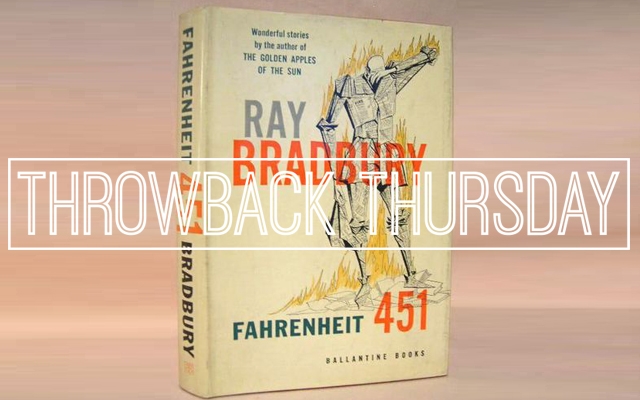What: Fahrenheit 451
When: First published in 1953
By: Ray Bradbury
The basics: Set in an unspecified city some time in “the future” (no date is ever given), Guy Montag is a “fireman,” someone who burns the possessions of those who read outlawed books. But his outlook on his career and the work he’s being asked to do begins to shift, taking the reader on a journey through ideas on censorship and the act of suppressing dissenting ideas.
The reason for the throwback: This is one of the books that changed my life.
I know that sounds cliché and people have attributed major life changes to some pretty bad books over the years, but Bradbury’s dystopian future where books were prohibited and being in possession of them meant your belongs — your house and everything in it — got set ablaze really started me thinking about concepts like censorship, freedom of speech and the press, and how non-traditional and unpopular opinions aren’t necessarily bad or wrong or unneeded.
Growing up, I wasn’t a big reader — I liked reading and was good at it, but nothing ever really captivated me other than “Choose Your Own Adventure” books. But once I hit high school and started getting some great literature and fantastic plays dropped into my lap, my appreciation of the written word and the power it carries grew exponentially.
And now here I am, a writer myself, so it only makes sense for a book about the impact, value and importance of written works would have a place close to my heart and near the top of my personal all-time favourites list.
There is more to it than that, however.
Though it was first published some 60 years ago, the future Bradbury envisioned and laid out could very well be today.
At one point in the story, Montag turns off the “parlor walls,” large televisions lining the living room walls, his wife and her friends are watching to engage them in a conversation about the major events of the world, but all the ladies care about are trivial aspects of the various current events.
Sound familiar?
Tabloid journalism and sensationalist news has become de rigueur these days and the idea of turning off the television, unplugging from smartphones or skipping the next Netflix marathon in order to read a book or have an actual conversation about world event sounds daunting to many.
Sixty years ago, Bradbury saw that books could be in danger and worried about losing the amazing medium to a slew of other options. Today, those other options have changed the way we consume media, in addition to helping dictate what is considered newsworthy. Books are now bought and consumed on Kindles and Kobos and tablets and the publishing industry, like print media in general, is in decline.
It was a tremendous read back in high school when it was dropped on my desk at St. Thomas More CSS in Hamilton, Ontario and it might be even better now that some of those crazy ideas about the future no longer seem so crazy.
Turn off the TV. Put down your iPhone.
Go pick up a book — this book or any other book — and spend the afternoon immersed in its brilliance.












